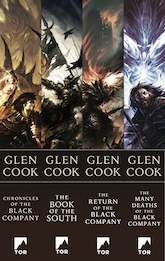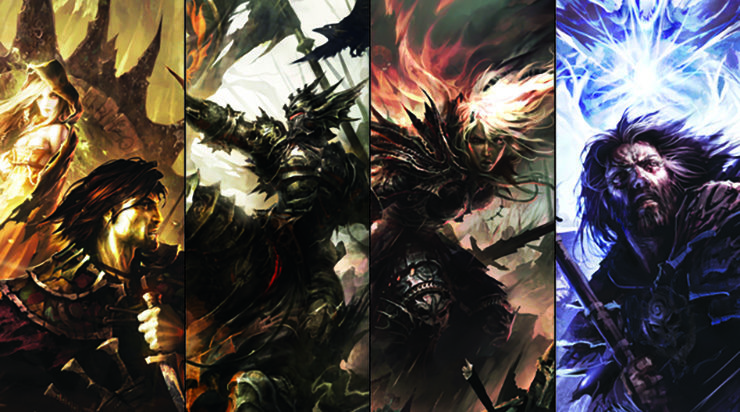During the early 2000s, the fantasy genre underwent something of a revolution. After decades of heroic epic fantasy, headlined by the likes of Robert Jordan, Terry Brooks, Anne McCaffrey, and David Eddings, a new subgenre erupted in popularity. The era of grimdark arrived, spearheaded by George R. R. Martin’s opus, A Song of Ice and Fire.
Martin’s as-yet-unfinished series was praised for its “realism” and low-level perspective. Instead of prophesied heroes and farmboys fighting Dark Lords, A Song of Ice and Fire focused on family drama, political meddling, and the gritty, depressing realities of war. It was a hit, to say the least, and reached stratospheric levels with the development of HBO’s Game of Thrones adaptation.
But Martin’s work (and subsequent authors like Joe Abercrombie, Mark Lawrence, and—especially—Steven Erikson) did not form the foundation of grimdark. No, it is the relatively unheralded Glen Cook who can properly be ascribed the title of “Godfather of Grimdark.”
Cook hit the map with 1979’s A Shadow of All Night Falling, the first book in his Dread Empire series. Written with a sparse, demanding style, Cook brought the epic fantasy genre down to the personal level. A Shadow of All Night Falling focused more on family politics and emotional consequences than the typical fantasy fare of the time.
Then came The Black Company in 1984, and the gloves were off.
Cook found his groove with the irascible mercenary company, hitting a balance with a distinctive, vibrant voice tempered with his trademark, bare-bones narration. Croaker, physician and Annalist for the titular mercenaries, became an instant favorite of readers. Chief among Cook’s fans were members of the United States military, especially during the first Gulf War.
When asked why soldiers found The Black Company so compelling, Cook responded simply:
The characters act like the guys actually behave. It doesn’t glorify war; it’s just people getting on with the job. The characters are real soldiers. They’re not soldiers as imagined by people who’ve never been in the service. That’s why service guys like it. They know every guy who’s in the books, and I knew every guy who’s in the books. Most of the early characters were based on guys I was in the service with. The behavior patterns are pretty much what you’d expect if you were an enlisted man in a small unit.
The tone Cook used, through Croaker, marked a dramatic shift from the heroic, Tolkien-esque fantasy that dominated the contemporary landscape. (That’s not to say that The Black Company is without its epic moments and big stakes, though.)
The first book opens with Croaker’s trademark snark, but he’s discussing fraught events: a centuries-old monster has escaped its tomb, and Beryl—the city the Company works for—is on the brink of a revolution. The forvalaka, a shape-shifting werepanther, is the spark in the barn, ready to set the entire city ablaze with violence.
And behind that all looms the specter of the inimical Lady of Charm, who has sent a legate to forge an alliance with Beryl and hire the Company.
The Company’s exploits under the patronage of the Lady run the gamut from harrowing to hilarious, creepy to lighthearted. Throughout them all is woven a moral theme: do you have a duty to a greater morality, or can you internalize honor? Confronted with the depredations of the Lady’s empire—and the Company’s part in keeping that empire intact—Croaker and his fellow soldiers must make intensely personal decisions with far-ranging consequences.
While those themes are most prevalent in the first three books (sometimes called “The Books of the North”), they remain in background through to the end of the final book, Soldiers Live.
And it’s not just in his style that Cook was ahead of his time. A trademark of his mercenary series is the impressive cast of female characters—all of whom have actual agency. Whether it’s the Lady or Darling setting off events in the Books of the North, or the wide range of Taglian women who run the show in the Books of Glittering Stone, Cook did an admirable job of filling his world with important, active, and dynamic characters, both male and female.
Buy the Book


Annals of the Black Company
Indeed, in several of the later books, the women entirely control events. No men get to make meaningful decisions where the Company is concerned. For a traditionally male-dominated subgenre like mercenary fantasy, that’s downright shocking.
Cook’s departure from traditional fantasy norms marked his name on the map, but his relative lack of more widespread popularity may in part be because of those stylistic differences. The sparsity of his descriptions can be jarring, especially for savvy fantasy readers who are used to painstakingly detailed worldbuilding and descriptions: unlike in Robert Jordan’s The Wheel of Time, for instance, you’ll find no multi-page passages describing the embroidery on dresses.
Cook leaves much up to the imagination of his readers. There are no maps present in his books, despite the importance of geography in several major battles. Few cultures are fully fleshed out, mostly because things like cultural economics or behavioral norms don’t have any impact on the Company. When they do, however, Cook shows no hesitation in explaining exactly what’s going on.
The result is a fast, efficient story with a fun and vibrant array of characters—and unlike much modern grimdark, The Black Company retains an undercurrent of optimism in the face of grim reality. Cook’s magnum opus remains a unique, refreshing take on the fantasy genre, even thirty-four years after the first volume was published.
Glen Cook’s Chronicles of the Black Company is available from Tor Books.
Drew McCaffrey lives in Fort Collins, CO, where he is spoiled by all the amazing craft beer. You can find him on Twitter, talking about books and writing, but mostly just getting worked up about the New York Rangers.











Eliza Dushku is currently in talks to produce and star in a tv adaptation of the black company. It’s either going to be awesome or horrible.
Hi
A great choice I have read most of this series, and especially enjoyed the first three books. Crocker, One Eye, Goblin, and Tom-Tom are wonderful characters. And I loved the Ten Who Were Taken they were so evil, I only wish we had seen more of them, with names like Bonegnasher, Moonbiter, Nightcrawler, Howler and the Faceless Man among others they just cried out for more backstory. But as you say Cook limited himself to the company, what they saw and knew. While it has been some time since I read it, Cook’s Matter of Time which combines time travel, with elements from spy and detective novels is also good.
Happy reading
Guy
Personally, I preferred his Garrett series, a noir P.I. in a high fantasy world, in which the endings are never entirely happy but, for the reader, they are satisfying.
I love Cook – probably read everything he’s published. I liked his Starfisher stories best, I think. Less grim, I suppose, more comic-booky, but still with the great mix of epic and ordinary.
For the longest time I didn’t think much of him as a stylist – his prose tends to be very condensed (“Hemingway-esque”?) to the point where you could skip a 3-word paragraph and miss the whole point. But I always figured he was just a poor typist, who didn’t want to write any more than absolutely necessary. Then I noticed that one of the later Black Company books dealt entirely with manifestations of time, while another concentrated on space. Then it all came together: he’s a subtle stylist, not as flashy as Silverberg for ex (another proponent of hard-boiled fantasy), but very strong.
It’s just that his lovable, deadly, relatable characters distract you.
@@@@@ Matt Kent,
She would make a good Lady/Soulcatcher, wouldn’t she?
Taye Diggs was born to be Mogaba
Who would play Croaker, though?
The Black company books are all worth a read, except the latest Port of Shadows.
@Jonellin Stonebreaker – Who would play Croaker, though?
The way the books are written, he should be played by the camera. We shouldn’t see him, the audience should be him…until the duties of the annalist are taken over by someone else.
Glen Cook changed fantasy as we know it, for sure. He’s awesome!
@Jonellin Stonebreaker She’s said that’s the part she wants to play.
@cross777 I disagree that he should be the camera. Croaker is the POV character the camera follows. Have the actor do voiceover for some things. Not all! A goodly portion of the internal monologue can be conveyed through non-verbal acting.
Many years ago I thought Sammy Davis Jr. would be perfect as One-Eye, and not because he also only had one eye. And Calvert DeForest, aka Larry “Bud” Melman, as Goblin.
Used to wait eagerly for each one of Glen Cooks books to hit the bookstores since the early 80s, having to buy multiple copies because people would borrow and never return them. Most of my adult life was spent reading Glen Cook. Although Mr. Cook deserves fame and fortune, a Black Company movie would probably be turned into Hollywood pablum, I am not interested in a movie.